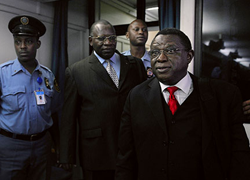Last Wednesday Judge Meron at the Rwanda International Criminal Tribunal lowered the sentence of the leader of Rwanda’s genocide. Here is a link to an article on the decision.
Colonel Theoneste Bagosora was alleged to be the person who made the decision to commit genocide against the Tutsis and set about planning and preparing for the massacres of 800,000 Tutsi men, women and children. At trial, the court convicted him of genocide, extermination and a host of other charges, and sentenced him to life imprisonment – the maximum sentence under current Tribunal practice.

Last Wednesday, the Appeals Chamber reduced this sentence to 35 years. The rationale was based on Chamber reversing some of the counts, even though the main convictions remained intact.
This sentence is the latest in a long line that demonstrate the flawed sentencing scheme at the international tribunal that produces ridiculous and insulting sentences. Tribunals will not issue consecutive sentences for convictions, but rather aggregate them into a single concurrent sentence of life imprisonment no matter how many counts in the indictment nor how many victims were involved. By contrast, the recent domestic prosecution in Guatamala of the Dos Erres massacres resulted in sentences of 12,000 years for a massacre involving 200 deaths – 60 years per victim aggregated consecutively.
Had the original sentence been based on sentences issued for each of the counts, there would be a good chance that overturning some counts would still leave a life sentence intact. As it stands, Bagosora stands convicted of playing a central role in the genocide but because the evidence was inconclusive regarding his role in a few of charged counts, he is sentenced to only 35 years.


